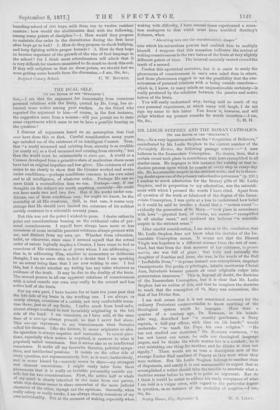MR. LESLIE STEPHEN AND THE ROMAN CATHOLICS. [TO THH EDITOR
OF THE ssrsersroa."] Sin,—Ina very ingenious article on the "Scepticism of Believers," contributed by Mr. Leslie Stephen to the current number of the Fortnightly 1?eciew, the following passage occurs :—" A man believes in the Immaculate Conception. He denies, then, that a certain event took place in accordance with laws exemplified in all similar cases. He impugns in this instance the validity of that in- ductive process upon which he counts at every step in every-day life. He is a scientific sceptic in the strictest sense, and he is throw- ing doubt upon one of the primary ratiocinative processes." (p. 259.) I confess to much admiration for the literary gifts of Mr. Leslie Stephen, and in proportion to my admiration, was the astonish- ment with which I perused the words I have cited. Apart from all question of the truth or falsehood of the dogma of the Imma- culate Conception, I was quite at a loss to understand hew belief in it could be said to involve a denial that a "certain event"— evidently the generation of St. Mary—" took place in accordance with laws"—physical laws, of course, are meant—" exemplified in all similar cases," and rendered the believer "a scientific sceptic in the strictest sense."
After careful consideration, I am driven to the conclusion that Mr. Leslie Stephen does not know what the doctrine of the Im- maculate Conception means. It means not that the Blessed Virgin was begotten in a different manner from the rest of man- kind, but that from the first moment of her existence, in gremio nuttris, she was full of grace ; that truly and naturally the daughter of Joachim and Anne, she was, in the words of the Bull " Ineffabilis Deus," "in prime instanti sum conceptionis, singulari Oninipotentis Dei gratis et privilegio, intuitu. ineritorum Chrieti Jesu, Salvatoria humani genesis ab omni originalis enlpm labe prreservatam immunem." This is, beyond all doubt, the doctrine of the Immaculate Conception, but it is clear that Mr. Leslie Stephen has no notion of this, and that he imagines the doctrine to teach that the conception of St. Mary was miraculous, like that of her Divine Son.
I am well aware that it is not considered necessary for the ordinary Protestant controversialist to know anything of the theological system which he impugns. More than a quarter of a century ago, Dr. Newman, in his inimit- able way, described how "5 country gentleman, a Navy captain, a half-pay officer, with time on his hands," would undertake "to teach the Pope his own religion." "1-re has not studied our doctrines," Dr. Newman continues, "lie has not learnt our terms, he calls our theological language jargon, and he thinks the whole matter lies in a nutshell ; lie is ever mistaking one thing for another, and he thinks it does not signify." These words are as true a description now of the average Exeter-Hall assailant of Popery as they were when they were written. But Mr. Leslie Stephen belongs to another class of disputants, and surely it is not unreasonable to expect that so accomplished a writer should take the trouble to ascertain what a doctrine means before he uses it to point an argument. Nor do I think it would be unfair to adduce his ready acceptance of what
am told is a vulgar error, with regard to the particular dogma in question, as an instance of the credulity of sceptics.—I am, Sir, &c.
Sextr,y House, Ely, September 3. W. S. LILLY.






























 Previous page
Previous page